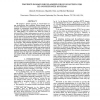Free Online Productivity Tools
i2Speak
i2Symbol
i2OCR
iTex2Img
iWeb2Print
iWeb2Shot
i2Type
iPdf2Split
iPdf2Merge
i2Bopomofo
i2Arabic
i2Style
i2Image
i2PDF
iLatex2Rtf
Sci2ools
116
Voted
ICIP
1999
IEEE
1999
IEEE
Wavelet-Domain Regularized Deconvolution for ILL-Conditioned Systems
by 0. In the discrete Fourier transform (DFT) domain, We propose a hybrid approach to wavelet-based image deconvolution that comprises Fourier-domain system inversion followed by wavelet-domain noise suppression. In contrast to conventional wavelet-based deconvolution approaches, the algorithm employs a regularized inverse filter, which allows it to operate even when the system is non-invertible. Using a mean-square-error metric, we strike an optimal balance between Fourier-domain regularization that is matched to the system and wavelet-domain regularization that is matched to the signal. Theoretical analysis reveals that the optimal balance is determined by economics of the input signal wavelet representation and the operator structure. The resultant algorithm is fast, O(N1og: N ) where N denotes the number of samples, and is well-suited to data with spatially-localized phenomena such as edges. In addition to enjoyingasymptotically near-optimal rates of error decay for some systems, t...
Conventional Wavelet-based Deconvolution | ICIP 1999 | Image Processing | Wavelet-based Deconvolution | Wavelet-based Image Deconvolution |
| Added | 03 Aug 2010 |
| Updated | 03 Aug 2010 |
| Type | Conference |
| Year | 1999 |
| Where | ICIP |
| Authors | Ramesh Neelamani, Hyeokho Choi, Richard G. Baraniuk |
Comments (0)

